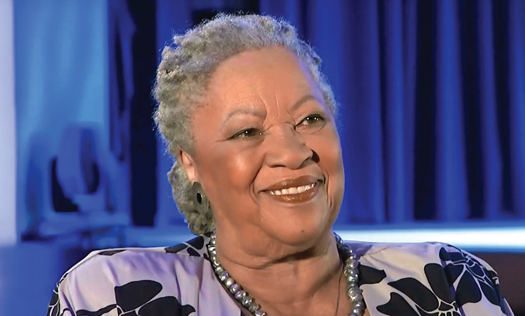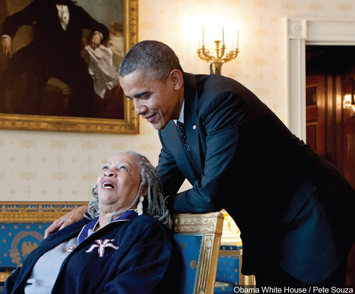Toni Morrison: an unapologetic literary ‘prophet’
By Nisa Islam Muhammad -Staff Writer- | Last updated: Aug 14, 2019 - 9:38:17 AMWhat's your opinion on this article?

Toni Morrison
|
Like countless college undergrads, Khalilah Watson, at the time, discovered Toni Morrison in an English class and her life was never the same.
“She saved me from indecision and gave me a new source of inspiration. Her writings spoke to me. They’ve always spoken to me. She wrote ‘Song of Solomon’ after her father died. It’s full of racism, sexism, materialism, and nationalism, the four impediments that don’t allow us to fully develop. She brings these to the forefront. She’s not trying to be Faulkner. She’s not trying to be Tolstoy. She’s not trying to be anyone but herself,” she told The Final Call.
Years later and a Ph.D. in English thanks to inspiration from Toni Morrison, Dr. Khalilah Watson Muhammad is now a life-time member of the Toni Morrison Society and teaches her works in Women’s Literature, English 101 and Freshman Composition at the Olive-Harvey College in Chicago as an assistant professor.
It was through being unapologetic and authentic, that Nobel laureate and Pulitzer Prizer winner Toni Morrison influenced and impacted generations through her literature. Ms. Morrison died Aug. 5 leaving behind an unequalled legacy. She was 88.
“Toni Morrison always chose to be Black unapologetically. It makes me think of Minister (Louis) Farrakhan and what the Honorable Elijah Muhammad gave him. The Minister stands firm in that. The reason why she writes is because of us first, Black people. She shows us how to be bold and how to have integrity. The Honorable Elijah Muhammad says ‘blessed is the one who forges a way forward.’ Because of Toni Morrison’s work as an editor at Random House, Muhammad Ali’s biography was done as well as Angela Davis’ book and Toni Cade Bambara’s book,” said Prof. Muhammad.
“In the Toni Morrison Society we quote her often and in fact we use the words from her books as a language. It’s called the language of Toni Morrison. We use it to deal with life. ‘She is a friend of my mind.’ She was a literary prophet. She was so bold and I cannot say enough about her.”
Toni Morrison was born Chloe Wofford in a racially mixed small town in Ohio. She started using the name Toni when she arrived at Howard University where she majored in English and minored in the classics. It was the shortened version of her baptismal Saint Anthony. While she was at Howard she was a homecoming queen, an actress and the dean of pledgees for Alpha Kappa Alpha Sorority, Inc.
After Howard she went on to get a masters from Cornell and returned to Howard to begin her career teaching. While teaching she also began writing as part of a faculty writers group. Her first novel “The Bluest Eye” published in 1970 came from a short story she wrote for that writers group.
She left teaching, a failed marriage with two sons and Washington, D.C., for New York where she enjoyed being an editor at Random House working with Black talent like Angela Davis and Toni Cade Bambara.
“It’s really hard to sum up the significance of Toni Morrison in a few words. She left such a huge, huge legacy. One of the things that I think is so brilliant about Toni Morrison is that she was very clear about centering all of her work in the experiences and histories of Black people. That was her world, that was her literary world, that was her literary imagination and she made no apologies about it,” historian Zaheer Ali told The Final Call.
“What’s so beautiful about that was when you read her work, there was no exceptionalizing, there was no exoticizing, there was no essentializing, everybody was Black and that allowed for a wide range of experiences to come through her work. I don’t know that we’ve had someone like really in the last half century who just laid bare the pain and suffering but also celebration and overcoming that is Black life. For that we are incredibly indebted.”
Her works could be found on the bookshelves of young, old, rich, poor, and transcended race as well as religion.

President Barack Obama talks with Presidential Medal of Freedom recipient Toni Morrison in theBlue Room of the White House, May 29, 2012.
|
“As Morrison once eloquently stated, ‘the function of freedom is to free someone else.’ Her work pushes us to reflect on the notion that freedom is not merely the act of dismantling oppressive systems but the ability to exist fully in our humanity. As we honor the transition of a woman who stood as a breathing Black library, we must also ask ourselves: How will we use our bodies, faith, and words to continue to build a road to freedom?”
Toni Morrison is the author of 11 books including the novel “God Help the Child” which tells the story of Bride, a “deep blue-Black skin girl” with a career in the cosmetics industry that is rejected by her light-skinned mother, Sweetness, poisoned by the White man’s color divide.
“It didn’t take more than an hour after they pulled her out from between my legs to realize something was wrong. She was so Black she scared me. Mid-night Black, Sudanese Black.”
Toni Morrison’s works are raw, rich and revealing of the wrongs and rights of what it meant to be Black in America. Her literary latitudes include a Pulitzer in 1988 for “Beloved,”which Oprah Winfrey made into a movie, a Nobel Prize in 1993, and, in 2012, the Presidential Medal of Freedom, from her very good friend Barack Obama.
“She was able to capture the Black experience in its truest color and not see us through the eyes of a deficit model but capture the strengths and vulnerabilities of a people and present them with a notion of challenges to racism and sexism. It was her capacity to capture this that gave psychological agency to people of African descent where they were not seen as having problems,” said Dr. Kevin Washington, head of Grambling State University’s Sociology and Psychology Department.
“The absence of such a creative spirit to capture Black life with such a sacred lens that had a clear vision and a clear focus on the deepest aspects of Black life has now been removed. We will miss then an authentic perspective of Black life being depicted by a social engineer, a social scientist, a purveyor of social thought and identity,” he added.
“That becomes the absent voice that we have grown to love and admire through her writing which then forces us to not only look at what we miss but listen to the messages she taught us and be able to carry on by seeing ourselves the people of power and progress and perspective.”
Ms. Morrison told The Guardian’s Hermione Hoby a seemingly last request in a 2015 interview: “There are two things I want to see in life. One is a White kid shot in the back by a cop. Never happened. The second thing I want to see: a record of any White man in the entire history of the world who has been convicted of raping a Black woman. Just one.”
When the writer checked back with Ms. Morrison, she stated: “Hasn’t happened,” she said of the first wish. “If it has happened, I don’t know a thing about it. But that second thing? Never. Uh-uh. No matter what she says. No, not a White man. Even if everyone knows about it.”
That was Toni Morrison.
INSIDE STORIES AND REVIEWS
-
-
About Harriett ... and the Negro Hollywood Road Show
By Rabiah Muhammad, Guest Columnist » Full Story -
Skepticism greets Jay-Z, NFL talk of inspiring change
By Bryan 18X Crawford and Richard B. Muhammad The Final Call Newspaper @TheFinalCall » Full Story -
The painful problem of Black girls and suicide
By Charlene Muhammad -National Correspondent- » Full Story -
Exploitation of Innocence - Report: Perceptions, policies hurting Black girls
By Charlene Muhammad -National Correspondent- » Full Story -
Big Ballin: Big ideas fuel a father’s Big Baller Brand and brash business sense
By Bryan Crawford -Contributing Writer- » Full Story






 Click Here Stay Connected!
Click Here Stay Connected!








